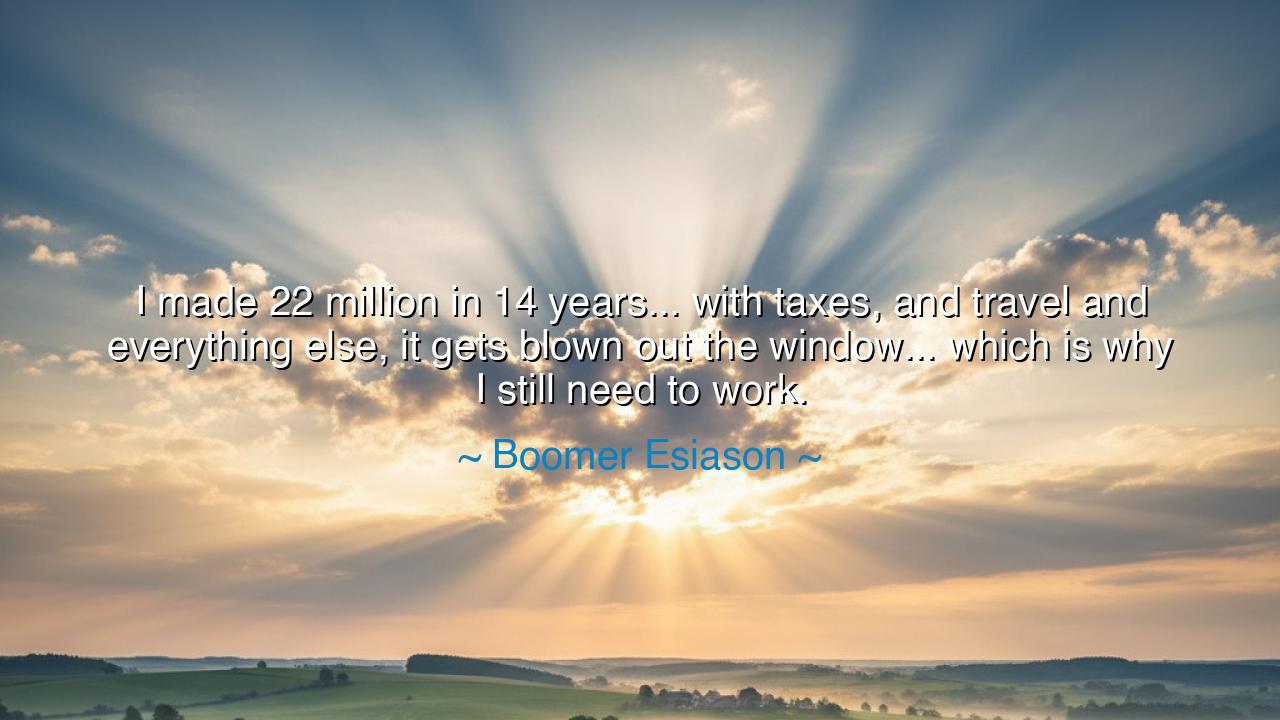
I made 22 million in 14 years... with taxes, and travel and
I made 22 million in 14 years... with taxes, and travel and everything else, it gets blown out the window... which is why I still need to work.






The words of Boomer Esiason — “I made 22 million in 14 years… with taxes, and travel and everything else, it gets blown out the window… which is why I still need to work.” — strike like a sobering bell against the illusions of wealth. They remind us that great fortunes, so dazzling to the eyes of the multitude, are often far more fragile than they appear. Riches, once thought to be eternal, are swiftly diminished by the weight of duty, the demands of life, and the hidden expenses that gnaw away at even the highest earnings. The voice here is not of complaint, but of truth: that money, whether in small measure or in great, cannot by itself guarantee security or freedom from labor.
The ancients understood this. The Roman philosopher Seneca warned that riches are like water poured into a jar with cracks: no matter how much is filled, it always escapes. Esiason’s reflection reveals the same wisdom in modern form. Though 22 million sounds vast, once divided over years, drained by taxes, consumed by obligations, and scattered by circumstance, it fades into something far less enduring. Thus, he continues to work, not as one betrayed by fortune, but as one who has learned that labor is eternal, and that no man, however wealthy, can wholly rest upon the gains of the past.
History is filled with such lessons. Consider the story of King Croesus of Lydia, famed for his boundless wealth. His gold was legendary, yet when he confronted Cyrus the Great of Persia, it availed him little. His riches could not buy safety, nor could they shield him from conquest. Or think of the countless athletes, actors, and rulers who lived in splendor but ended in poverty, their fortunes spent or seized. Wealth is a shadow, a fleeting companion. What endures is character, discipline, and the will to continue one’s work even when riches ebb.
Esiason’s words also remind us of humility. Many look upon the wealthy and imagine their lives are free of struggle. Yet he confesses that despite his great earnings, he must still rise and labor like all others. The lesson here is universal: no one escapes the necessity of purpose. Work is not a curse, but a condition of human life. It is what keeps the spirit sharp and the hands useful. When one believes that wealth alone will grant endless leisure, disappointment soon follows. True fulfillment is not in idleness, but in meaningful effort.
There is also a deeper wisdom in this admission. The true danger is not only that money is fleeting, but that the pursuit of money without discipline blinds us to its impermanence. The travel, the luxuries, the comforts of fame — these drain wealth faster than one realizes. Just as emperors squandered treasuries on spectacles, so too can the modern man consume his riches without noticing the tide going out. Esiason’s honesty serves as a caution: even the mighty must live with prudence, for gold melts like snow beneath the sun of life’s demands.
The lesson is clear: do not place your trust in fortune, nor imagine that wealth, once earned, will forever shield you. Live with wisdom. Guard what you are given. And above all, understand that work is not something to be cast aside once riches are gained, but the very essence of life itself. For in work we find discipline, identity, and the power to contribute to the world.
Practical actions follow. Learn to live below your means, however high they may be. Save diligently, and remember that taxes, obligations, and the unforeseen will always diminish wealth. Do not despise work, but embrace it as the anchor of life. Cultivate a craft, a service, or a calling that can endure when fortunes rise and fall. Let your security be not in riches, but in resilience, skill, and purpose.
So remember, child of tomorrow: wealth may dazzle, but it fades. Work endures. Do not envy the one who boasts of millions, for often he too must rise each morning and labor still. Instead, find strength in the knowledge that dignity lies not in what you have, but in what you do. For as Boomer Esiason teaches, even 22 million can vanish, but the will to work is a treasure no one can take away.






AAdministratorAdministrator
Welcome, honored guests. Please leave a comment, we will respond soon